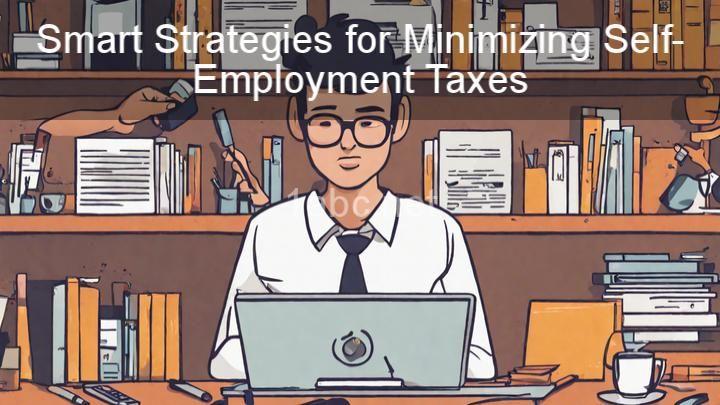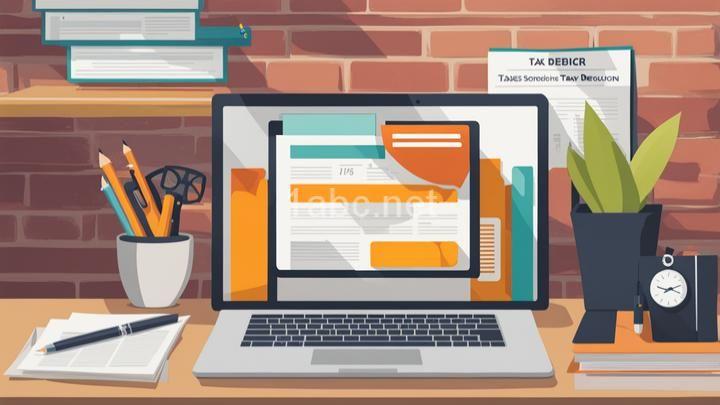Smart Strategies for Minimizing Self-Employment Taxes

Introduction:
Hey there, fellow self-employed individuals! Welcome to our blog post on smart strategies for minimizing self-employment taxes. We know that taxes can be a daunting topic, but fear not, because we're here to break it down for you in a friendly and approachable manner. So grab a cup of coffee, sit back, and let's dive into the world of self-employment taxes together!
I. Understand Self-Employment Taxes:
Before we get into the strategies, let's start by understanding what self-employment taxes actually are. In simple terms, self-employment taxes are the taxes that self-employed individuals are required to pay on their business income. As a self-employed individual, you're not only responsible for income tax but also for paying the employer portion of Social Security and Medicare taxes.
II. Keep Accurate Records:
One of the key aspects of minimizing self-employment taxes is maintaining accurate financial records. Keeping track of your income and expenses is crucial for determining your taxable income and claiming deductions. Make sure to organize your records in a systematic manner, whether it's using spreadsheets, accounting software, or even dedicated apps for record keeping. By doing so, you'll have a clear picture of your finances and be better prepared come tax time.
III. Claim All Eligible Deductions:
As a self-employed individual, you have the opportunity to claim various deductions to lower your taxable income. Some common deductions include expenses related to your home office, equipment, and other business-related costs. However, it's important to note that not all expenses may be eligible for deduction, so it's a good idea to consult with a professional if you're unsure. By taking advantage of eligible deductions, you can significantly reduce your tax liability.
IV. Consider Establishing a Retirement Plan:
Setting up a retirement plan is not only a smart financial move but can also have tax benefits for self-employed individuals. By contributing to a retirement plan, such as a Solo 401(k) or SEP IRA, you can lower your taxable income and potentially defer taxes on your contributions until retirement. This not only helps you save for the future but also minimizes your tax burden in the present.
V. Optimize Estimated Tax Payments:
As a self-employed individual, you're responsible for making estimated tax payments throughout the year to cover your tax liability. It's important to calculate these payments accurately to avoid underpayment penalties. Utilize resources such as Form 1040ES and IRS Publication 505 to calculate your estimated tax amounts. Additionally, consider reviewing your income on a quarterly basis and adjusting your payments if necessary. By staying on top of your estimated tax payments, you can avoid surprises come tax time.
VI. Explore Business Entity Options:
Choosing the right business entity type can have a significant impact on your self-employment taxes. Sole proprietorship, LLC, and S-corporation are some common options to consider. Each entity type has its own tax implications, so it's wise to consult with a legal or tax professional before making a decision. They can help you understand the tax advantages and disadvantages of each option and guide you in choosing the one that best suits your business and tax goals.
VII. Seek Professional Guidance:
While we've covered some smart strategies in this blog post, it's important to remember that everyone's tax situation is unique. Seeking professional guidance from a certified accountant or tax professional is highly recommended. They can provide personalized advice tailored to your specific circumstances and help you navigate the complex world of self-employment taxes. Don't be afraid to reach out and ask for assistance – it can save you time, money, and unnecessary stress.
Conclusion:
Congratulations! You've made it to the end of our blog post on smart strategies for minimizing self-employment taxes. We hope that you've found the information helpful and insightful. Remember, by understanding self-employment taxes, keeping accurate records, claiming all eligible deductions, considering retirement plans, optimizing estimated tax payments, exploring different business entity options, and seeking professional guidance, you can minimize your self-employment taxes and keep more of your hard-earned money.
Thank you for taking the time to read our blog post. We're here to support you on your self-employment journey, so if you have any questions or need further assistance, feel free to reach out. Best of luck with your tax planning and may your self-employment journey be prosperous and fulfilling!
FREQUENTLY ASKED QUESTIONS
What is Smart Strategies for Minimizing Self-Employment Taxes?
Minimizing self-employment taxes is a common goal for many self-employed individuals. Here are some smart strategies to consider:
- Understand self-employment taxes: Familiarize yourself with the different types of self-employment taxes, such as Social Security and Medicare taxes, and how they are calculated. This knowledge will help you make informed decisions regarding tax planning.
- Deduct business expenses: Keep track of all your legitimate business expenses and aim to maximize deductions. This includes expenses such as office supplies, mileage, equipment, and even a home office if it qualifies. By deducting these expenses, you can reduce your taxable income and thereby lower your self-employment tax liability.
- Consider forming an LLC or an S-corporation: Depending on your business structure, you may be able to reduce your self-employment tax burden by forming a limited liability company (LLC) or electing to be treated as an S-corporation for tax purposes. This can allow you to pay yourself a reasonable salary and classify the remaining income as distributions, which may be subject to lower tax rates.
- Contribute to retirement plans: Self-employed individuals have various retirement plan options, such as a Simplified Employee Pension (SEP) IRA or a solo 401(k). By contributing to these plans, you can lower your taxable income, potentially reducing your self-employment taxes, while simultaneously saving for retirement.
- Keep up with estimated tax payments: As a self-employed individual, you are typically required to pay estimated taxes throughout the year. Staying on top of these payments can help you avoid penalties and interest charges while effectively managing your tax liability.
- Consult with a tax professional: Lastly, it's always wise to seek advice from a qualified tax professional who specializes in working with self-employed individuals. They can help you navigate the complexities of self-employment taxes, identify additional tax-saving opportunities specific to your situation, and ensure compliance with tax laws.
Remember, while it's essential to minimize self-employment taxes, it's equally important to do so within the bounds of the law. Always consult with a tax professional to ensure that you are taking advantage of legitimate strategies and complying with all tax regulations.
How can this content help me reduce my self-employment taxes?
This content can provide you with valuable information and strategies to help reduce your self-employment taxes. It may cover topics such as deductions and credits that you may qualify for, retirement account options, and other tax planning strategies specific to self-employed individuals. By implementing these tips and strategies, you may be able to maximize your tax savings and reduce the amount of taxes you owe as a self-employed individual.
Who is this content suitable for?
This content is suitable for anyone who is looking for assistance or answers to their questions across various topics. It can be used by individuals, professionals, students, or anyone in need of support.
Are these strategies applicable to all types of self-employed individuals?
Yes, these strategies can be applicable to various types of self-employed individuals, regardless of their specific field or industry. The strategies discussed are generally applicable to anyone who is self-employed and looking to improve their business or professional skills.




